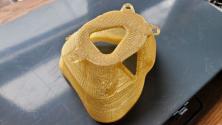If there was an overarching message from the speakers at last week's Open Hardware Summit, particularly those in the first morning block, it's that openness isn't that critical. It sounds strange coming from a conference whose name starts with "open," but speaker after speaker talked about hybrids and doing whatever worked, not just doing what was open.
That's not to say they don't believe in the power of openness. The first words of Wired magazine editor-in-chief Chris Anderson's opening keynote were the very foundation of open source: "Everything I've learned as I built my own business is because people shared what they knew."
But he went on to reflect on the past few years that have been the real beginning of the open hardware movement and its organization, saying, "This is not the time to be dogmatic. We have to evolve as we grow. There are many open hardware businesses, and somebody in this room will build a billion-dollar one. Not by sticking to the plan from three years ago and being rigid about it, but by learning from the community."
The bulk of Anderson's keynote was about the seven lessons he's learned about the limitations of open source hardware, from unstoppable cloning to challenges with investors, marketing, and pricing. Interspersed with those limitations, however, were stories of open source success, like one in which one of his company's "pirates," a Chinese company that was cloning their board, ended up becoming a part of the company. How? They simply asked him be a participant, rather than treating him like the enemy.
His conclusion was a set of "alternatives"—a conditional license with restrictions on commercial use, releasing schematics only, or having open software for closed hardware. "I don't think we should be dogmatic," Anderson repeated. "We need to consider other possibilities and approaches to open-based innovation."
Many in the audience were waiting for the afternoon session that included Bre Pettis, co-founder and CEO of MakerBot, creators of a popular open source 3D printer. Earlier in the week, the company announced its latest product, the Replicator 2 3D printer. At the same time, Pettis announced to much controversy, "For the Replicator 2, we will not share the way the physical machine is designed or our GUI because we don’t think carbon-copy cloning is acceptable and carbon-copy clones undermine our ability to pay people to do development."
In his Open Hardware Summit talk, he mentioned those who make improved derivatives positively. Cloners, on the other hand, he felt more strongly about. "People said, 'You did open source hardware; this is totally allowed under the license. What did you expect?'" he explained. "It's true. They're right. This is the result of something we did, but that doesn't mean we have to like it."
He said that they chose not to share the design files for the Replicator 2 body because of materials. It's made of powder-coated steel and requires a manufacturing facility for the steel-bending—not something the average garage hobbyist could do. They're also keeping the GUI closed for the MakerBot MakerWare software to maintain control over the look and feel.
But in Pettis' brief remarks beyond the week's controversy ("Enough drama," he said, "let's talk about the future."), Pettis was optimistic about the power and potential of open source.
"With the tools we have today, we have the opportunity to take manufacturing back into homes, back into garages," he said. "Now we're in a place with 3D printing and the tools we're collectively making—we have an opportunity to inspire so much creativity in the world."
Pettis asked how many in this room of people who had gathered to discuss open hardware were able to create open source infrastructure in their day jobs. About a third of the room responded that they do. "What do we have to do so that all of you can raise your hands to that question so we can all contribute to the greater good?", he asked.
The Open Hardware Summit was also the official launch of the Open Source Hardware Association, which held this year's event and is now accepting members. The open hardware community is increasingly coming together, and even in the criticisms of the challenges of openness and the voice of one who has pulled away from a purely open philosophy, there's still belief in its potential. Open hardware still offers a lot of advantages, which Anderson mentioned as well, from free to low-cost R&D and customers doing the product development to what he called a "natural business model." What remains to be seen is how much the community will continue to embrace openness in the face of challenges that set the hardware world apart from software.







4 Comments